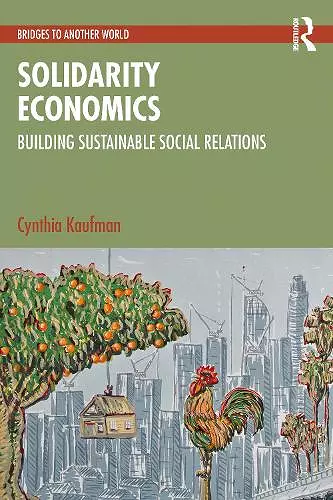Solidarity Economics
Building Sustainable Social Relations
Format:Paperback
Publisher:Taylor & Francis Ltd
Published:21st Jan '26
Should be back in stock very soon
This paperback is available in another edition too:
- Hardback£155.00(9781032867861)

Organizers all around the world are working to build ways of managing resources that serve human and ecological needs. But how can these projects be more than small islands of solidarity and sustainability surrounded by oceans of domination and environmental destruction?
Solidarity Economics: Building Sustainable Social Relations lays out the landscape of these projects aimed at building a better world, and explores the institutional frameworks needed for them to expand. It asks broader questions about what is needed to help them build toward just and sustainable societies based on relations of solidarity. Drawing on Indigenous economics and anti-capitalist theory, this book critiques the idea of an economy as something autonomous from the rest of society and helps us see practical pathways to building systems which ensure that everyone’s needs are met.
This accessible book provides an important overview of key issues around social theory, the environment, and practical social action to investigate new ways of overcoming the cultural and social issues around class, race, gender, climate change, human identity, and economics.
“Cynthia Kaufman’s latest book Solidarity Economics is a must-read for anyone considering how to build a more just, equitable, and sustainable world. For many, thinking beyond a capitalist economy gets us stuck, and the oft-quoted phrase is ‘It’s easier to think of the end of the world than it is to think of the end of capitalism.’ Kaufman, however, makes an alternative to capitalism feel much more within our grasp and very much achievable in the near future. True to form, Kaufman’s writing is incredibly approachable and stays away from the heavy academic jargon that often keeps great ideas from reaching the general public. Drawing from a wide variety of thinkers, writers, and already-existing real-world examples, Solidarity Economics emphasizes the social world and kinds of relationships that can emerge and already are emerging when we organize and relate outside of the bounds of capitalism. Importantly, however, Kaufman also explains the history and philosophical underpinnings that form the foundation of social relations under capitalist logics—in this way, we know how we got here as well as where we want to go from here. That destination for Kaufman is an economy based on the values solidarity, connection, and well-being, rather than money and other forms of value under capitalism. Arguing that a scarcity mindset only encourages self-defeating competition and harmful individualism, Solidarity Economics contends that there is enough for everyone under mutualism. This perspective is a much-needed breath of fresh air for those grappling with constructing and nurturing the world we want to live in.”
Belinda Ramírez, Sociology and Global Public Health, Binghamton University
“Solidarity Economics is the book we desperately need in these dark times. Kaufman makes the hopeful slogan ‘Another world is possible’ persuasively concrete with powerful arguments about constructing a solidarity economy even as our dominant economic system slides into deeper crisis.”
Fred Block, Research Professor of Sociology, University of California, Davis. Author of Habitation Society.
“I appreciate Cynthia Kaufman’s recognition that Indigenous peoples live solidarity economics and promote relationship-building to preserve their solidarity with non-humans and humans. Indigenous objections to colonialism are among the many good critiques of capitalism, authoritarianism, and patriarchy which Kaufman reviews so well. She is right to urge cooperation among the many movements as they build community power and support revolutionary reform.”
Ronald L. Trosper, Professor of Native American Studies, University of Arizona, and author of Indigenous Economics
“Solidarity Economics provides an encyclopedic account of the movements on nearly every continent that advance creative strategies and viable models aimed at repairing the systems built on profit and domination that now pose an existential threat to our collective survival, giving us a detailed roadmap of practical and far-reaching methods and programs to win the world we want, one that centers people, the planet, and our collective well-being. Get this book and put it to use!”
Ron Hayduk, Professor of Political Science, San Francisco State University
"Cynthia Kaufman’s amazing guide to solidarity economics helps us understand one of the most basic concepts by which our world is being rebuilt from within. Connecting with writers and social movements in many fields of knowledge around the globe and through the past century, the book brings readers up to date on thinking and action that is filled with hope and possibilities."
Kathryn Kish Sklar, History, Binghamton University. Author of Florence Kelley and the Nation's Work: The Rise of Women's Political Culture, 1830-1900
“In these times of extreme inequality, state violence, and ecological breakdown, Solidarity Economics shows us that things don’t have to be this way. Humans aren’t naturally selfish and violent, and indeed people all over the world are engaged in building alternative institutions based on cooperation and equity. This book is a helpful introduction to key principles and examples of a solidarity economy. It also illuminates how capitalism obstructs the growth of alternatives and how solidarity-based institutions can confront its obstructions.”
Kevin A. Young, Associate Professor of History, University of Massachusetts, Amherst, and author of Abolishing Fossil Fuels: Lessons from Movements That Won
ISBN: 9781032853055
Dimensions: unknown
Weight: 300g
152 pages